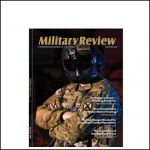
e-Document
|
Military Review, March-April 2005.
Copies
0 Total copies, 0 Copies are in,
0 Copies are out.
Nicaragua: Civilians and Military after the Sandinista Revolution. Margarita Castillo Villarreal; In Nicaragua, negotiations transformed a rebel army to a nonpartisan national army, but the consolidation of civilian control of the armed forces remains a work in progress.
Strategic Scouts for Strategic Corporals; Major Ron Sargent, U.S. Army; Conventional military forces rarely fare well operating in regions with alien cultures. The Army trains FAOs to be regional specialists. Should a FAO serve on the division/UEx staff?
Current and Future Warfighting
The Evolution of Information Operations at Brigade and Below. Lieutenant Colonel Arthur N. Tulak, U.S. Army; Major Kelly R. Broome, U.S. Army Reserve; and Captain Donnie S. Bennett, U.S. Army; The post-Cold War paradigm for U.S. Armed Forces is changing the way the Army conducts information operations.
Anthropology and Counterinsurgency: The Strange Story of their Curious Relationship. Montgomery McFate, J.D., Ph.D.; During World War II, anthropologists served as both researchers and secret operatives, but they have avoided the national security arena since the Vietnam Warwith grave consequences for counterinsurgency operations in Iraq.
Somalia: Soldiers in SOSO. Robert C. Blackstone; The Armys experience in Somalia in 1993 demonstrated that combat-trained soldiers imbued with a warrior ethos can move rapidly between political and combat missions in SOSO.
The Philippines: Nation building and Pacification. Brian McAllister Linn, Ph.D.; The Armys successful counterguerrilla operations in the Philippines from 1899 to 1903 show that maintaining law and order is important when establishing a new government.
Ratification of the Chemical Weapons Convention: Strategic and Tactical Implications. Major Peter L. Platteborze, U.S. Army, Ph.D. The Chemical Weapons Convention will render U.S. Armed Forces less likely to face chemical-warfare threats. The treatys ratification makes good sense militarily, politically, and economically.
Iraq: Italian Lessons Learned. Riccardo Cappelli; In the spring of 2004, insurgents armed with Kalashnikov assault rifles and RPGs created great difficulties for 3,000 Italian soldiers in Iraq. Italy must spend more resources to prepare and equip its soldiers to fight in urban areas.
Military Cultural Education. Colonel Maxie McFarland, U.S. Army, Retired; Becoming more aware of cultural differences and exploring similarities helps officers and soldiers communicate effectively in deployments where mission performance demands significant interface with indigenous populations.
Bosnia and Herzegovina: Coalition Doctrine and LOT Houses. Major General Virgil L. Packett II, U.S. Army; Colonel James F. Smith, U.S. Air Force Reserve; Lieutenant Colonel Edwin P.Woods, U.S. Army; and Major Edward C. Guilford, Jr., U.S. Army National Guard; Early in its peacekeeping mission, a key SFOR objective was to maintain situational awareness by establishing liaison and observation team houses.
Review Essay
Vietnam: General Vo Nguyen Giap. Colonel William S. Reeder, Jr., U.S. Army, Retired, Ph.D.
Black Soldiers in Blue. Lieutenant Colonel Edwin L. Kennedy, Jr., U.S. Army, Retired
Campfires of Freedom. Major Jeffrey C. Alfier, U.S. Air Force
Book Reviews: contemporary readings for the professional
Monthly Index
Title
Military Review, March-April 2005.
Call No
CDMC Military Review
Digital Link
Subjects
Counterterrorism French Algeria Northern Ireland Peace-building Nicaragua Foreign area officers Post-Cold War National security anthropology Counterinsurgency Somalia Peace-building Philippines Culture awareness Bosnia-Herzegovina Lessons learned Italian army Iraq Chemical warfare Vo, Nguyen Giap, 1912- Vietnam
Language
English
Published
Fort Leavenworth, KS : Combined Arms Center,, 2005.
Series
Target Audience
Unknown or not specified









